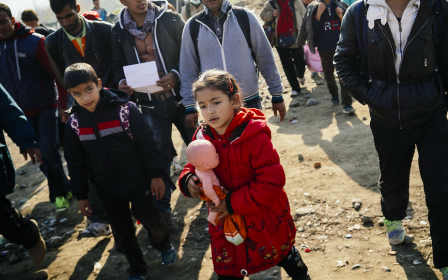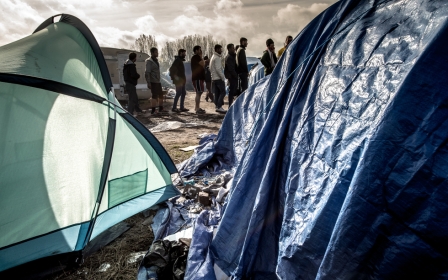US states shun Syria refugees after Paris attacks

At least eight US states are seeking to block a programme to resettle Syrian refugees within their borders, citing security fears in the wake of the Paris attacks.
The movement swelled on Sunday and Monday, prompting President Barack Obama to push back by urging the United States to "step up and do its part" to help those fleeing war-torn Syria.
In the United States, Republican presidential hopefuls Marco Rubio and Jeb Bush said outright America must not take in Syrian refugees because they might include Islamic State militants.
And Republican state governors lined up to reject plans to resettle Syrians on US soil.
"Given the tragic attacks in Paris and the threats we have already seen, Texas cannot participate in any programme that will result in Syrian refugees - any one of whom could be connected to terrorism - being resettled in Texas," Governor Greg Abbott of the large southern state wrote on Monday in a letter to Obama.
Abbott urged the president to halt his plans to resettle thousands of Syrian refugees in the United States, arguing that the government could not provide safety guarantees.
"As such, opening our door to them irresponsibly exposes our fellow Americans to unacceptable peril," he said.
Mississippi Governor Phil Bryant issued a similarly blunt statement, saying: "I will do everything humanly possible to stop any plans from the Obama administration to put Syrian refugees in Mississippi."
Obama's policy of welcoming such individuals "is not only misguided, it is extremely dangerous".
Alabama and Michigan announced their opposition to Syrian refugees on Sunday. In addition to Mississipi and Texas, they have been joined by Arkansas, Indiana, Louisiana and Illinois. All eight states are led by Republican governors.
'Shameful'
Alabama Governor Robert Bentley opposed Democrat Obama's plans, saying: "I will not stand complicit to a policy that places the citizens of Alabama in harm's way."
Governor Rick Snyder, whose state of Michigan is home to one of America's largest concentrations of Middle East immigrants, said he had decided to suspend arrivals of Syrian refugees under Obama's programme until the Department of Homeland Security completes a "full review" of security clearances and procedures.
Michigan's leading newspaper, the Detroit Free Press, reported that between 1,800 and 2,000 refugees have resettled in the state over the past year, about 200 of whom were from Syria.
Another US governor, Louisiana's Bobby Jindal who also is running for the Republican Party's 2016 presidential nomination, wrote to Obama on Saturday expressing "grave concern" about allowing Syrian migrants into the country, and saying it would be "prudent to pause the process."
"Authorities need to investigate what happened in Europe before this problem comes to the United States," Jindal wrote.
Jindal complained he was kept in the dark about Syrian refugees as they began arriving in New Orleans earlier this month.
"It is irresponsible and severely disconcerting to place individuals, who may have ties to ISIS, in a state without the state's knowledge or involvement," he said.
Claimed by the Islamic State group (IS), Friday's coordinated attacks targeting revellers at a Paris concert, restaurants and the national stadium left at least 129 dead and raised fears of a similar assault by militants on US soil.
Obama, speaking Monday from Turkey where he is attending a summit of the world's top economies, said it is "very important... that we do not close our hearts to these victims" of Middle East violence.
He attacked as "shameful" Republican presidential candidates' calls for refocusing aid on Christian refugees, rather than Muslims.
"That's not American," he said.
UN hits out over refugee backlash
The United Nations also hit back on Monday at calls to turn back refugees from Syria to prevent groups or individuals like those who carried out the Paris attacks from entering as purported asylum-seekers.
European countries, Canada and the United States are facing calls to deny entry to refugees after French investigators said one of the Paris attackers was a Syrian national who may have slipped into Europe as part of a wave of migrants.
"It is understandable that countries need to take whatever measures they need to take to protect their own citizens against any forms of terrorism," said UN spokesman Stephane Dujarric.
"But focusing that on refugees, vulnerable people who are themselves fleeing violence, would not be the right way to go," he said.
"These are people who are fleeing the very destruction of Daesh that we have seen in Paris."
Washington State governor Jay Inslee shared similar sentiments and made his position clear on the welcoming of refugees to his state:
“Sadly, in the wake of these attacks, many people channel their fear and anger against ISIS into fear and anger against Muslims. At a time when millions of Syrian families are attempting to flee ISIS and seek refuge in safer parts of the world, including the United States, there are some who say it’s time to close our doors to people whose lives are in peril,” said Inslee in a statement.
“Washington will continue to be a state that welcomes those seeking refuge from persecution, regardless of where they come from or the religion they practice. We have been and will continue to be a state that embraces compassion and eschews fear mongering, as evidenced so well by Republican Gov. Dan Evans’ welcoming of Vietnamese refugees here in the 1970s,”
Obama in September announced US plans to take in 10,000 Syrian refugees by September 2016. The White House has stressed the plan carries little risk because there is a "robust" vetting process in place.
Middle East Eye propose une couverture et une analyse indépendantes et incomparables du Moyen-Orient, de l’Afrique du Nord et d’autres régions du monde. Pour en savoir plus sur la reprise de ce contenu et les frais qui s’appliquent, veuillez remplir ce formulaire [en anglais]. Pour en savoir plus sur MEE, cliquez ici [en anglais].




